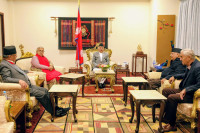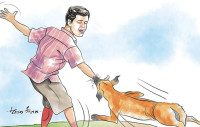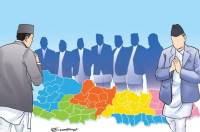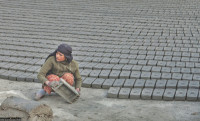Opinion
Rags to riches
Nepal could transform itself if it learned from Lee Kuan Yew and devised policies to mobilise its human resources
Sandhya Regmi
Whoever governs Singapore must have that iron in him. Or give it up. This is not a game of cards! This is your life and mine! I’ve spent a whole lifetime building this and as long as I’m in charge, nobody is going to knock it down.”
This inspirational quote fairly reflects the doctrine applied by political maverick Lee Kuan Yew in repositioning Singapore’s map from the third world to the first. The visionary, prime minister from 1959 to 1990 and influential politician until 2011, died on March 23 at the age of 91.
Dreamland
When I first entered Singapore in 2001, soon after my two-year stay in Japan as a researcher at the University of Tokyo, the first thing that astonished and welcomed me was the brilliant greenery and dazzling cleanliness of the perfectly managed and preserved metropolitan garden city. I had not seen such a thing even in the highly developed European countries during my stay in Germany and visits to its neighboring countries. Singapore looked like a princess clad in silk and satin. Chewing gum was banned, littering was fined, and corruption was dealt with. It was a place that practically guaranteed honourable, respectable, and safe lives for women and children alike—free from both environmental and social pollutions. I recall my days, when I commuted by train, bus, and on foot, all the way from the National University of Singapore, sometimes reaching my residence, Bedok North, at midnight, without any feeling of insecurity.
In 50 years, under the Singaporean Lion’s visionary leadership, the country was transformed from an impoverished British colonial outpost on a swampy island with no natural resources—a stinking fisherman’s village suffering from poverty, malaria, and dengue—into a dreamland. Today, Singapore stands tall on the global map as a knowledge-based economy, with one of the highest GDP per capita ($55,182) in the world. It has a minimal 2 percent unemployment rate, is third in global education, is among the three least corrupt nations (alongside Finland and New Zealand) in the world, and has the lowest crime rates. A dream city in the real world.
This miraculous achievement made by Lee’s Singapore has brought into the limelight the issue of whether and to what extent other countries may draw from Lee and his Singaporean model. In Nepal’s context, the pyramid of Lee’s doctrine might be dissected as follows.
Beggar mentality
The vision for a prosperous country and people forms the top block of the pyramid. Nepal needs vision that goes beyond a ‘beggar mentality’, which seeks to achieve a threshold on poverty and education over a decade or two. We need a vision that is founded on the stability, health, and prosperity of our people and the country. In the past, some of our politicians had pledged to make Nepal like Singapore. But a vision differs from such daydreams in that a vision is based on the state’s robust and time-bound plan and strategy, with a discrete roadmap to achieve the underlying goal.
Sincerity and accountability of the state operators could constitute the second block. In fact, until it is installed in the system, the accountability can easily be swapped to the top of the pyramid in a country like ours, where even after spending billions of rupees from taxpayers’ money, our 601-member-strong Constituent Assembly has failed to deliver a 100-page document. Why not put them to the test to see if they are playing a ‘game of cards’, or if they are really working with the feeling of ‘life’ that Lee was referring to? Just look at Lee’s spirit: “Even from my sickbed, even if you are going to lower me to the grave and I feel that something is going wrong in Singapore, I will get up.”
Iron laws
The need for the elimination of the prevailing practice of power abuse and corruption by authorities in all organs of the state does not need to be overemphasised. The recent case of Dr Govinda KC’s satyagraha typifies the extent to which the country is swamped with this evil at all levels of the state administration. We need to introspect on why state decisions are being sold or abused, and how the matter could be resolved. While moral codes and ethics work for the majority, it does not seem to do so for all. So, strict punishment codes to account for such abusers need to be drafted. No mercy for the corrupt; no shelter for criminals; no undue favours for anyone. Lee’s Singapore did not drop its ‘iron’, despite a mercy plea by US president Bill Clinton in 1994: the American Michael Fay was not spared being caned on a graffiti charge. The law applied equally to all.
To put the country on the track of prosperity, Nepal must put state-endorsed anarchism to an end. Sparing peaceful demonstrations, it should ban and criminalise all forms of strikes organised by political parties, trade unions, educational institutes, or others. At best, a strike is an abuse of democracy and others’ rights. At worst, it provides cover to anarchists at the cost of the country and people.
Lee’s Singapore has proved to the world that human resource can be the most powerful of all resources. For inclusive prosperity, Nepal, which is rich in human resources, must devise mechanisms for, and provide its citizens access to, quality education, medical facilities, housing and other basic needs.
And finally, the country must stop begging and focus instead on enacting and implementing investor-friendly laws and regulations. The resource-starved Singapore—which even lacked drinking water earlier—was not transformed by begging from others or by any Official Development Assistance fund, but by brilliant policy formulations and implementations. By drafting and implementing such policies, Nepal can do better, considering the advantages of natural resources that we have.
Regmi was a researcher at the National University of Singapore from 2002-2004




 15.12°C Kathmandu
15.12°C Kathmandu










